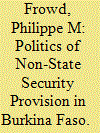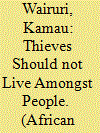|
|
|
Sort Order |
|
|
|
Items / Page
|
|
|
|
|
|
|
| Srl | Item |
| 1 |
ID:
184706


|
|
|
|
|
| Summary/Abstract |
Matched sampling methodology (MSM) has been used in remittance studies to understand remittance transfers. However, a detailed examination of the role of trust as a central element in producing reliable and valid research conclusions when a matched sample methodology is used has been missing in the literature. This paper fills this lacuna by arguing that cultivating trust in matched sampling research on remittance transfers, a sensitive subject matter, between African immigrants and their relatives presents a more nuanced narrative of remittance transfers. This approach shows that not only do African immigrants in the ‘Global North’ send remittances back home, but immigrants also receive remittances (reverse remittances) from their relatives on the continent. Using remittance research conducted among Ghanaian immigrants in the UK and their relatives in Ghana, this article identifies three ‘avenues of trust’—‘public avenues of trust’, ‘intermediate avenues of trust’, and ‘private avenues of trust’—to highlight the processes and challenges that researchers encounter while establishing contact with research participants and the role that trust plays in gathering accurate information. Focusing on the role of trust in MSM is in line with recent theoretical paradigms of remittance research that call for soliciting information from both origin and destination countries.
|
|
|
|
|
|
|
|
|
|
|
|
|
|
|
|
| 2 |
ID:
184705


|
|
|
|
|
| Summary/Abstract |
This article examines the rise of the koglweogo self-defence groups in Burkina Faso, developing an empirical analysis of their practices and a conceptual approach to their ambiguous status. The article describes the ‘koglweogos’’ rise since 2014, their growth across urban and rural areas in Burkina Faso, and their involvement in tasks from crime-fighting to counterterrorism. The article builds on the existing literature on vigilantism and security provision in African states and outlines a conceptual framework highlighting the koglweogos’ pursuit of recognition. The koglweogo toggle between overlapping ‘amateur’ and ‘professional’ repertoires of security discourse and practice, pursuing recognition as security professionals but also the autonomy and flexibility of working in the margins. This emphasizes the symbolic value, social and political contestability, discursive construction, and imaginaries of security whilst eschewing a state/non-state binary. The article draws on fieldwork carried out with multiple koglweogo groups to highlight their role as auxiliaries in global security governance, their production of security claims in the absence of recognition, their production of public authority, and their relationship of collaboration with and contestation of the state. The article concludes with reflections on the broader utility of the concept of ‘security amateur’ in Africa and further afield.
|
|
|
|
|
|
|
|
|
|
|
|
|
|
|
|
| 3 |
ID:
184704


|
|
|
|
|
| Summary/Abstract |
This article explores the expansion of informal property rights documents through the case of chiefs’ titles in Zambia. Entrepreneurial chiefs have created written land rights for citizens on customary land in the form of letters, signed maps, and certificates. These documents are an alternative to state land titling that allows chiefs to maintain their control over land. However, chiefs’ titles are extra-legal: they are enforced by the same traditional leaders who govern unwritten customary rights, raising doubt about whether written land rights can strengthen citizens’ land claims without changing the existing power structures. Evidence from 121 interviews with chiefs, bureaucrats, and smallholder farmers and a survey of over 5,500 citizens shows that, despite their flaws, chiefs’ titles do increase citizens’ perceptions of tenure security. This suggests that informal property rights documents can be a powerful tool in a citizen’s arsenal. Further, these findings illustrate a process of adaptation and change within customary land institutions.
|
|
|
|
|
|
|
|
|
|
|
|
|
|
|
|
| 4 |
ID:
184702


|
|
|
|
|
| Summary/Abstract |
This paper examines how communities at the urban margins, who are under-protected by the state police, understand police reforms through an examination of the unusual case of street protests in support of a police officer who had killed two young men in Githurai in Nairobi. I explore how the under-protection of communities at the urban margins by the police leads to a reliance on various forms of vigilantism to generate security and justice outcomes. Noting the limitations of community vigilantism, I explore how these communities come to rely on police vigilantism, a form of vigilantism that has received limited attention in African studies. Based on insights generated from data collected in Githurai in March and April 2015, I argue that residents of Githurai protested against the arrest of a local police vigilante, whom they had come to rely on for security, because they considered his deployment of violence against suspected criminals to be justified and also feared that his arrest would expose them to further insecurity. I conclude that police reform efforts should pay attention to the innovations that communities have developed at the grassroots to generate security and justice outcome in absence of reliable protection by the state police.
|
|
|
|
|
|
|
|
|
|
|
|
|
|
|
|
| 5 |
ID:
184700


|
|
|
|
|
| Summary/Abstract |
Tanzania’s legislature, or Bunge, has undergone considerable change in recent decades, gradually strengthening to attain unprecedented influence during Jakaya Kikwete’s presidency (2005–2015) only to decline again under President John Magufuli (2015–2021). This article investigates Bunge’s institutional evolution, asking what explains institutional change within an authoritarian legislature, dominated in this case by the ruling party, Chama Cha Mapinduzi. Building on recent literature highlighting the influence of elite contestation on legislative outcomes, the article seeks to go further by probing the nature and origins of the elite factions driving legislative institutional change. It uses insights from a recent political settlements literature, as well as older work on African political economy, to outline how changes to Tanzania’s Parliament have both reflected—and magnified—shifting patterns of elite contestation within CCM. These elite power struggles, in turn, vary with changes in the extent of private wealth accumulation and the related expansion of rival patron–client factions. When private accumulation has continued relatively uninhibited, as was true under Kikwete but not Magufuli, then factional contestation intensified and surfaced in parliament, helping to drive legislative institutional strengthening. For this analysis, I use interview and archival data gathered during extensive fieldwork.
|
|
|
|
|
|
|
|
|
|
|
|
|
|
|
|
| 6 |
ID:
184701


|
|
|
|
|
| Summary/Abstract |
How has the process of institution and governance building in Africa, a domain traditionally subject to western development interventions, been changed by Chinese-led development? Taking Uganda’s roads sector, and particularly its main implementing agency the Ugandan National Roads Authority as a case study, I argue that traditional donors’ influence on sectorial institution building has not been replaced or dislodged by China’s growing presence. This presence primarily took the form of Chinese construction companies operating as profit-driven contractors interested mainly in quick project turnaround rather than in systematically shaping sectorial governance in the host country. Moreover, not only did traditional donors’ development financing remain dominant vis-à-vis China, but the ways in which their interventions were designed, exercised, and monitored in the post-conditionality regime characteristically differed from their Chinese counterparts, ensuring their embedded and enduring role in the reforming of sectorial state institutions. As such, a tacit division of labour took shape between Chinese and western engagements in Uganda’s roads sector: China focused on ‘hard’ physical road construction whilst traditional donors on the ‘soft’ aspects of sectorial governance and policy. The availability of both forms of development engagements with their distinctive foci enables issue-specific agency for Uganda to develop its roads sector, and yet they together appear to create favourable conditions for the Ugandan leadership’s increasing authoritarianism.
|
|
|
|
|
|
|
|
|
|
|
|
|
|
|
|
|
|
|
|
|